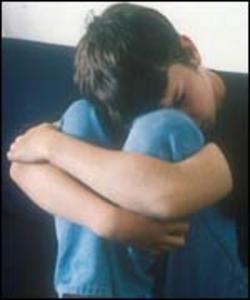
Treatment rates for depression have doubled in this country over the past ten years, and with millions on antidepressants a disturbing question was bound to come up at some point: can the disorder affect young children? A new study that's sure to spark passionate debates claims that chronic depression may be observed in tots as young as three.
It's true, say researchers from Washington University, that most kids go through mood swings and temper tantrums but quickly recover. Some children under the age of six, however, engage in chronic behaviors very similar to those of subjects suffering from major depression, a condition that usually begins in adolescence or young adulthood. The subject has been examined before. Children in this most recent study (many of whom had conveniently been diagnosed beforehand) apparently displayed many of the disorder's most common symptoms: insomnia, restlessness, physical aggression, an inability to enjoy regular activities, and an attraction to drawings and games dealing with pain, death and other disturbing subjects. Unsurprisingly, the children most likely to behave in these ways were those who'd experienced serious personal traumas like emotional, physical and sexual abuse or the death of a parent or close family member. Over the course of the two-year project, these "troubled" kids had problems overcoming their conditions; at study's end, 1 in 5 of the kids who'd been diagnosed still displayed the same problematic behaviors. So can we call their conditions chronic depression, or do they more closely resemble long-term PTSD? And could antidepressant medications help them in any way? The study doesn't attempt to answer these questions.
Researchers did not consider competing treatments, but they reported that a small but rising number of young children are now taking psychiatric medications like Prozac and Lexapro. This is a dangerous practice that should be discouraged due to the fact that no testing has established the effects of these drugs on the developing brains of preschool-aged kids. While multiple surveys and a huge increase in prescription rates show that Americans are far more accepting of mental illness and more likely to accept treatment today than they were in the past, most parents will rightly balk at the idea of issuing medication to such young children. If mental health professionals look to act on this supposed revelation, alternate treatment methods must be discussed. Personal psychotherapy is a possibility, but the idea of children so young making gains in therapy sessions is barely credible and requires more study.
We can all agree that far too many children suffer more than they ever should, whether due to physical illness, economic circumstances, or the abusive actions of others. And this study makes clear that such personal traumas can have long-term effects even on the very young. The matter of whether these experiences constitute diagnosable disorder and how parents and professionals should respond will be discussed for some time to come. At this point, the study looks designed to provoke controversy. And no responsible mental health professional should advocate chemical treatments for these children. |